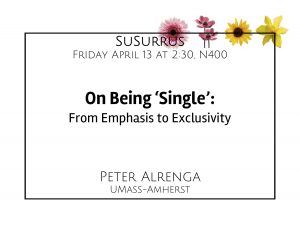Pete Alrenga will speak in SuSurrus on Friday, April 13 on being `single’. The exact time and location might shift a bit; right now we think it will be at 2.30pm in N-458. Watch your email for details.
======
On being ‘single’: From emphasis to exclusivity
Pete Alrenga
A well-known feature of the modifier ‘single’ is that it gives rise to two sorts of interpretations when it occurs in an indefinite noun phrase. In simple affirmative sentences, ‘single’ semantically conveys “no more than one”, and thus patterns with other exclusive modifiers in producing upper-bounded truth conditions. In NPI-licensing environments, ‘single’ fails to trigger such an inference, and instead has a purely emphatic effect. In these environments, ‘single’ patterns with scalar minimizers.
(1) {A single, Only one} student came to my office yesterday. (#In fact, several of them did.)
(2) John didn’t see {a single person, a soul} during his morning walk.
While uses of ‘single’ as in (2) have figured in the NPI literature, little attention has been paid to the use of ‘single’ in positive contexts, much less to the relation between the two uses illustrated in (1) and (2). In the first part of this talk, I develop a unified approach to these uses, one which takes their emphatic character as its starting point. In line with much recent work on NPIs, I account for this shared property via ‘single’’s mandatory association with the silent operator EVEN. This assumption derives its behavior in negative sentences like (2) straightaways. I further show that in positive sentences like (1), the semantic upper-bounding that ‘single’ produces can also be made to follow from its mandatory association with EVEN. In the second part of the talk, I consider some of the implications of this analysis for our understanding of scalar minimizers and exclusive modifiers more generally.


